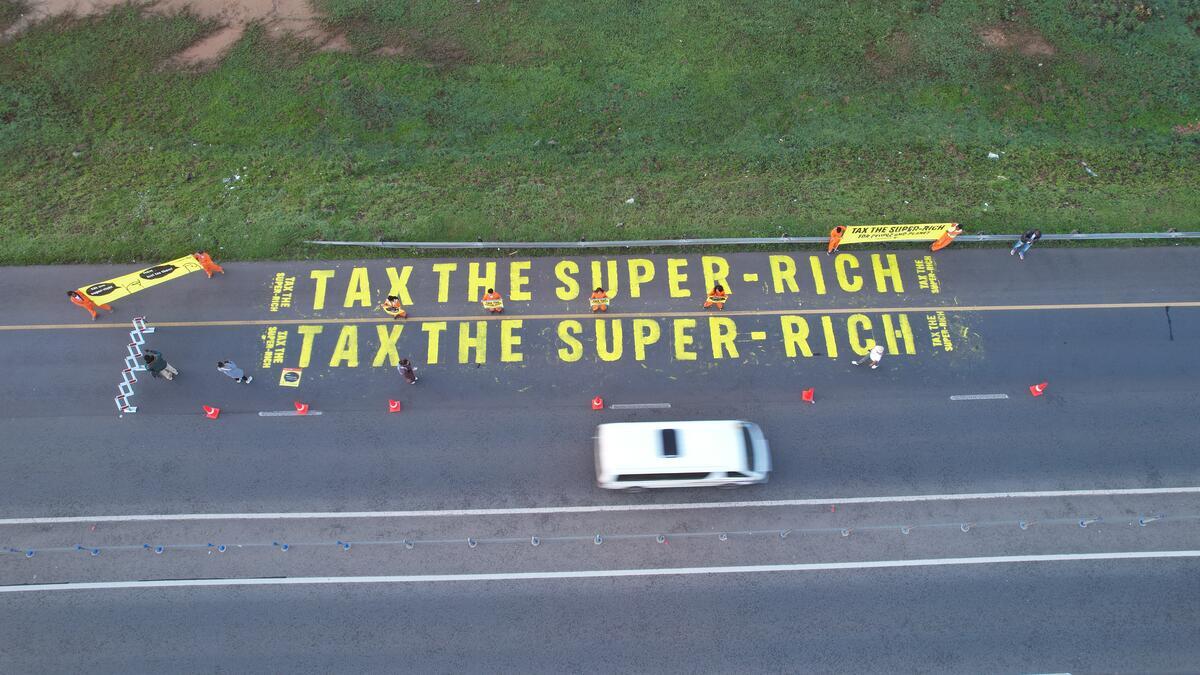Johannesburg, South Africa, 22 November 2025 – Greenpeace has called on the G20 to ramp up their plans to cut emissions and make progress on global tax reform by taxing the super-rich to unlock public finance for climate mitigation, adaptation and social justice.
Ahead of the G20 Heads of States Summit, Greenpeace Africa activists also painted ‘Tax The Super-Rich’ on a major road leading to the Johannesburg Expo Centre, where world leaders will be gathering.
The action comes at a pivotal moment as the UN climate conference COP30 in Belém, Brazil, winds down after difficult negotiations on efforts to transition away from fossil fuels, end forest destruction and to progress climate finance for vulnerable countries. In Nairobi, the latest round of UN Tax Convention negotiations, which could unlock vital climate funds, have shown little interest in the proposal for a global minimum tax on the super-rich. The G20 Summit in South Africa now offers President Cyril Ramaphosa a critical opportunity to lead globally on climate justice, including advancing discussions on a wealth tax and raising ambition among G20 leaders.[1]
Fred Njehu, Fair Share Global Political Lead, Greenpeace Africa said: “Public momentum to tax the super-rich is fast growing – the political will has to follow with concrete actions. Billionaires in Africa and beyond are getting wealthier by the day, while billions are struggling with rising cost of living and escalating climate crisis. Making the wealthiest pay their fair share is essential to fund the fight against the climate crisis, mobilise domestic revenues for public services, and advance sustainable development. The G20 Summit is President Ramaphosa’s opportunity to turn words into action and show that South Africa – and Africa – can lead the world, and secure a place in history.”
New analysis published in a recently released G20 report shows that between 2000 and 2024, the world’s wealthiest 1% captured 41% of all new wealth, while just 1% went to the 50% of humanity at the other end of the scale. An Oxfam report found that over the last five years in Africa, the five richest African billionaires have increased their wealth by 88%.[2][3]
At the INC-3 of the UN Tax Conventions in Nairobi this month, Greenpeace called for stronger commitments to secure much-needed public finance for climate mitigation, nature protection, and sustainable development by ensuring the super-rich and corporate polluters pay their fair share in taxes. These measures could deliver on the COP29 finance commitment for developed countries to mobilise at least US$300 billion per year by 2035, and to scale up to at least US$1 trillion in public finance in line with needs.[4][5]
Cynthia Moyo, Lead Campaigner, Greenpeace Africa, said: President Ramaphosa must seize this G20 moment to back a Fair Share approach that makes the super-rich and big polluters pay what they owe. We cannot keep socialising costs while privatising profits. African citizens deserve transparency and a tax system that truly serves them. We cannot fund a green and equal future with a broken tax system. Tax justice is climate justice and without bold action on a global wealth tax and making polluters pay, the resources needed to protect people and the planet will remain out of reach.”
Ahead of the G20 Summit, Greenpeace International launched a new report, revealing the insufficient climate ambition in new 2035 emissions targets (Nationally Determined Contributions – NDCs) of the G20 countries. The report, 2035 Climate Ambition Gap, revealed the 2035 climate action plans of the G20 would yield just a 23-29% cut in emissions towards the 60% global reduction that is needed.
Attending COP30 in Belém, Tracy Carty, Climate Politics Expert, Greenpeace International said: “When the G20 countries – responsible for 80% of global emissions – deliver collective climate action plans that fall dangerously short, the world has a problem. Given their historic responsibility for emissions and greater financial capacity to act, developed G20 countries should be out front, cutting emissions far in excess of the 60% global average needed. The choices of G20 countries, especially developed ones, will make or break the 1.5°C goal, and it’s time to hold them to account.”
ENDS
Photos and video available for download via the Greenpeace Media Library.
Cynthia Moyo is available for interviews throughout the G20 and after for reflections.
Notes:
[1] South Africa is part of the Seville Platform for Action, launched at the UN Financing for Development (FfD) Forum in June, which calls for progressive taxation to finance our future.
[2] G20 report led by Nobel Laureate Joseph Stiglitz.
[3] Oxfam International report: Africa’s Inequality Crisis and the Rise of the Super-Rich.
[4] The UN Framework Convention on International Tax Cooperation is an historic opportunity to redistribute power and wealth, and foster tax transparency and accountability.
[5] Media briefing on Greenpeace demands and expectations for the UN Tax Convention.
Contacts:
Ferdinand Omondi, Communications and Storytelling Manager, Greenpeace Africa, +254 722 505 233, [email protected]
Greenpeace International Press Desk, +31 (0)20 718 2470 (available 24 hours), [email protected]
Source link
Greenpeace International www.greenpeace.org

